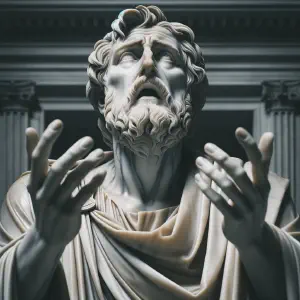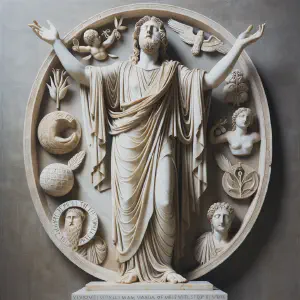The Revelation of Eternal Life
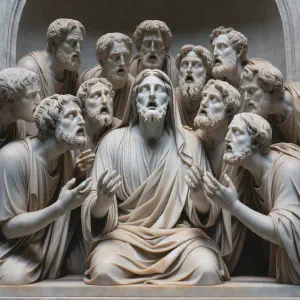
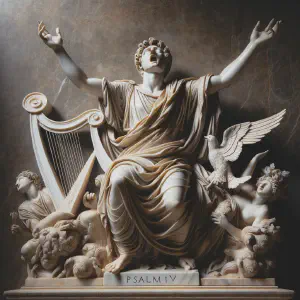
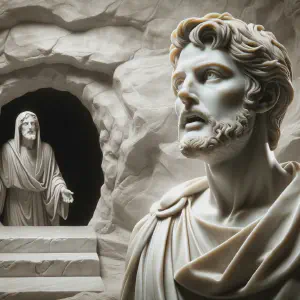
Finally, the other disciple stepped inside, his eyes widening in realization and faith. The empty tomb was not a sign of loss but a testament to the greatest truth ever revealed to mankind. He saw and believed. In that moment of epiphany, the threads of the readings intertwined, revealing the grand tapestry of God’s plan. The Word of life, once hidden, now made visible, had conquered death itself, inviting all into an eternal fellowship of joy, justice, and truth. The alleluia of the apostles resounded through the ages, a chorus of praise for the Lord who had triumphed gloriously.
Five Questions
How does the description of the Word of Life in 1 John enhance our understanding of Jesus’ divinity and humanity?
The Word of Life, as described in 1 John, deeply roots Jesus’ identity in both divinity and humanity. This passage emphasizes that Jesus is not just a spiritual entity or abstract concept. He was physically present, seen, heard, and touched by the disciples. This tangible experience of Jesus as the Word made flesh underscores the reality of God becoming man, which is central to understanding the mystery of the Incarnation. It bridges the gap between the divine and human, showing us that God intimately entered into our human experience.
In the context of Psalm 97, what significance do justice and joy hold in the life of a believer?
Psalm 97 uniquely intertwines justice and joy, presenting a profound insight into the character of God and its impact on believers. God’s reign is characterized by justice, suggesting that His rule is fair, righteous, and impartial. This justice isn’t cold or distant; it’s a source of joy for the righteous. It assures believers that God’s governance of the world is aligned with moral truth and righteousness. For those who walk in God’s ways, this realization brings deep joy and comfort, knowing that the universe is under the just and loving rule of God.
The reaction of Peter and the other disciple at the empty tomb in John’s Gospel—how does it reflect different responses to the Resurrection?
Peter and the other disciple’s reactions to the empty tomb encapsulate two common responses to the Resurrection. The other disciple, upon reaching the tomb first and looking in, hesitates, symbolizing a cautious but hopeful faith. Peter, arriving later, enters directly into the tomb, reflecting a more assertive and bold approach. This illustrates the varying ways people come to believe in the Resurrection: some with immediate conviction and others with a more reflective, contemplative faith. Both journeys, however, lead to the same conclusion of belief and understanding.
What role does fellowship play in the message of 1 John, and how is it relevant to modern Christians?
Fellowship in 1 John is not just a concept but a living reality of Christian life, deeply connected to the experience of Jesus Christ. This fellowship extends vertically, with the Father and His Son, and horizontally, with one another. It implies a community bound together by the shared experience of the divine. For modern Christians, this emphasizes the importance of community in faith life. It’s not just about individual belief but about sharing, supporting, and growing in faith together. This communal aspect of Christianity is essential for spiritual growth and living out the Gospel in everyday life.
Reflecting on the joy expressed in Psalm 97 and the Resurrection story, how can we incorporate this joy into our daily lives?
The joy in Psalm 97 and the Resurrection story transcends mere happiness; it’s deeply rooted in the recognition of God’s sovereignty and the victory of life over death. To incorporate this joy into our lives, we need to adopt a perspective that sees beyond immediate circumstances. It involves trusting in God’s justice and goodness, regardless of life’s challenges. Recognizing the Resurrection as a historical and spiritual reality brings a profound sense of hope and joy, knowing that Christ has overcome the world’s darkness. This joy becomes a daily choice to live in the reality of God’s love and victory, shaping our interactions, decisions, and outlook on life.
Bible Study
1 John 1:1-4
Beloved:
What was from the beginning,
what we have heard,
what we have seen with our eyes,
what we looked upon
and touched with our hands
concerns the Word of life —
for the life was made visible;
we have seen it and testify to it
and proclaim to you the eternal life
that was with the Father and was made visible to us—
what we have seen and heard
we proclaim now to you,
so that you too may have fellowship with us;
for our fellowship is with the Father
and with his Son, Jesus Christ.
We are writing this so that our joy may be complete.
This passage, written by John the Apostle, emphasizes the tangible reality of Jesus Christ, the Word of Life. John, a key figure in the early Church and the author of several New Testament writings, provides a first-hand account of his experience with Jesus. The passage aligns with Catholic values by affirming the Incarnation (God becoming man) and the importance of fellowship in the Christian community, echoing the Catechism’s emphasis on the communal nature of faith. It also touches on the joy of faith, a central theme in Christian life.
Psalm 97:1-2, 5-6, 11-12
R. (12) Rejoice in the Lord, you just!
The LORD is king; let the earth rejoice;
let the many isles be glad.
Clouds and darkness are around him,
justice and judgment are the foundation of his throne.
R. Rejoice in the Lord, you just!
The mountains melt like wax before the LORD,
before the LORD of all the earth.
The heavens proclaim his justice,
and all peoples see his glory.
R. Rejoice in the Lord, you just!
Light dawns for the just;
and gladness, for the upright of heart.
Be glad in the LORD, you just,
and give thanks to his holy name.
R. Rejoice in the Lord, you just!
Attributed to David, the second king of Israel and a man after God’s own heart, Psalm 97 celebrates God’s sovereignty and justice. It aligns with Catholic teachings on the righteousness of God and His just rule over the earth. The psalm’s emphasis on joy for the just and the call to give thanks to God’s holy name resonate with the Catholic values of gratitude and rejoicing in God’s providence. This passage reflects the Catholic understanding of God’s justice as a source of joy and comfort, aligning with the Church’s teachings on divine justice and mercy.
John 20:1a and 2-8
On the first day of the week,
Mary Magdalene ran and went to Simon Peter
and to the other disciple whom Jesus loved, and told them,
“They have taken the Lord from the tomb,
and we do not know where they put him.”
So Peter and the other disciple went out and came to the tomb.
They both ran, but the other disciple ran faster than Peter
and arrived at the tomb first;
he bent down and saw the burial cloths there, but did not go in.
When Simon Peter arrived after him,
he went into the tomb and saw the burial cloths there,
and the cloth that had covered his head,
not with the burial cloths but rolled up in a separate place.
Then the other disciple also went in,
the one who had arrived at the tomb first,
and he saw and believed.
The Gospel of John, traditionally attributed to John the Apostle, recounts the discovery of the empty tomb by Mary Magdalene, Simon Peter, and the beloved disciple. Mary Magdalene, a devoted follower of Jesus and the first to witness the resurrected Christ, represents faithfulness and devotion. Simon Peter, the first Pope, embodies leadership and human frailty. The beloved disciple, often identified as John himself, symbolizes love and belief. This passage aligns with Catholic values by underscoring the central tenet of faith: the Resurrection. It illustrates the transformation from doubt to faith and the importance of personal encounter with Christ, central themes in Catholic theology, particularly in relation to the sacraments and the grace bestowed through them.
Lessons
These sacred readings from Holy Scripture convey profound truths of our faith. In 1 John, we are reminded of the tangible reality of Jesus Christ, the Word of Life, who was from the beginning and made visible to us. This revelation invites us into deep fellowship with the Father and His Son, promising complete joy. The Psalm echoes this joy, celebrating God’s just reign and the gladness bestowed upon the righteous. In the Gospel of John, the resurrection narrative powerfully illustrates the transformation from doubt to faith, as seen in the disciples’ encounter with the empty tomb. These passages collectively teach us about the profound mystery of Christ’s incarnation and resurrection, urging us to rejoice in the Lord’s eternal triumph and to embrace the communion offered to us in Him. They are a call to steadfast faith, rejoicing in God’s justice, and living in the light of His truth.
Meditation Prayer
